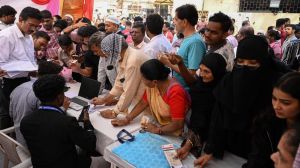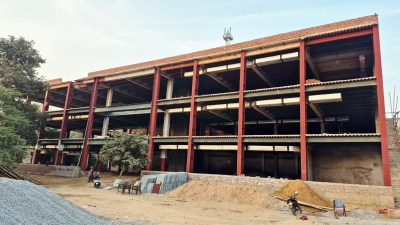Ramayana Reinvented
Imran Ali Khan and Smriti Wadhwa's documentary,Bheetar Lagi-The Ramayana in Song explores the lives of the Muslim Manganiar community that earns a living by singing Hindu folk songs
Imran Ali Khan and Smriti Wadhwa’s documentary,Bheetar Lagi-The Ramayana in Song explores the lives of the Muslim Manganiar community that earns a living by singing Hindu folk songs
The Ramayana is a timeless story,which every person interprets differently. For the Manganiar community in Rajasthan,however,the Ramayana is not just a story; it is a way of life,” says Imran Ali Khan of Open Space,a Pune-based open cultural forum. The Manganiars,a Muslim community that earns a living by singing Hindu folk songs,is the subject of Ali Khan’s study for his documentary film titled Bheetar Lagi The Ramayana in Song. The documentary about the dwindling community will be released as part of Open Space’s project Kiski Kahani – The Ramayana Project ,which explores Ramayana and how it has impacted society.
When Ali Khan began working on the Ramayana Project,which aims to bring together and discuss the different versions of the Ramayana in the country,scholars on the subject gave him several leads to follow,including the Manganiars. Ali Khan,along with colleague Smriti Wadhwa,soon took a train to Jaisalmer where they met up with a few Manganiar artistes.
Living in Bhaiya,a little-known village near Jaisalmer,the Manganiars continue to sing the spiritual and epic works of iconic poets such as Tulsidas and Mirabai,which constitutes their primary source of income. Though there is very little recorded history about the Manganiars and their music,they date back to at least seven generations. While their earlier patrons were wealthy Rajput families and merchants,now they perform at music festivals,weddings and other private events. “It’s amazing how their community continues to sing songs from generations ago and how they orally pass on their knowledge from one generation to the next in these times of internet and television,” says Ali Khan.
The community sings in several languages,including Hindi,Sindhi and their own language,Marwari. They spend over four hours practising everyday. “They say they would never lose touch with their traditions and music because it was in their blood. We saw six-month-old babies bobbing their heads to the music and children begin learning these songs in their early years,” informs Ali Khan.
The family with which Ali Khan and Wadhwa stayed for two days in the village,gave them a very different perspective on what the future could look like for the Manganiars. The young son in the family,Swaroop Khan,participated in the fifth season of Indian Idol and is now a playback singer in Hindi movies. “They family says that they are artistes and do not discriminate between various forms of music. But they are also certain that all community members will parallely continue the tradition of reciting folk songs,” he says. The duo also travelled to the Kalakar Colony in Jaisalmer where they met Barkhat Khan,another Manganiar artist. Ali Khan mentions that he divides time between working as a farm hand in his village and providing an education for his kids to insure their future.
The 27-minute documentary will explore the issues that Manganiars face in order to survive while also depicting their daily life and exploring possibilities for their future. The film has been shot in Hindi and includes six songs sung in Marwari,the language of the Manganiars. Open Space plans to release the documentary at a screening during the Ramayana Project sessions. A DVD will be on sale at a nominal price and members of Open Space will get a copy of the documentary with the magazine.







